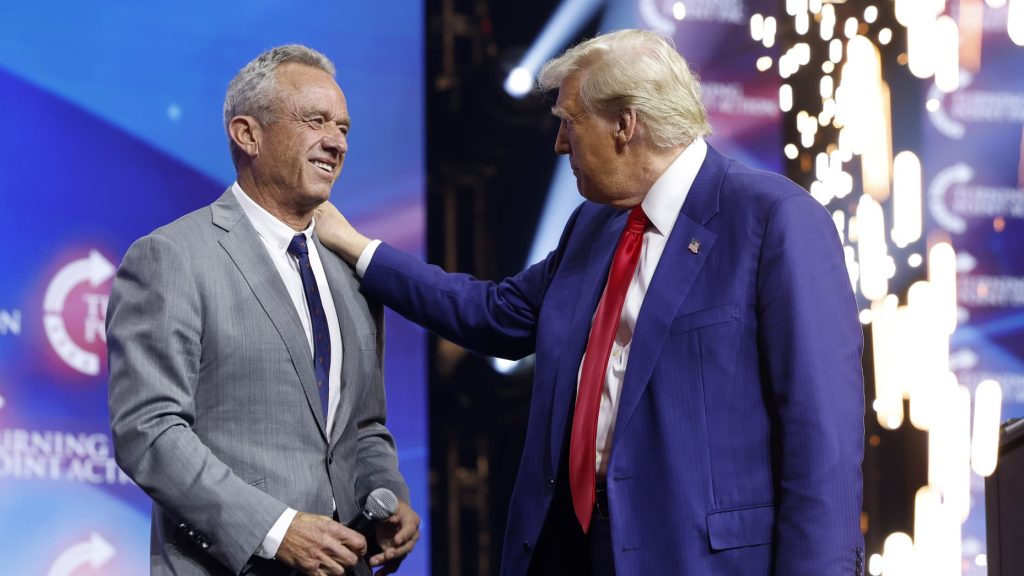Shares in vaccine manufacturers and healthcare companies plunged on Friday, following the announcement that former President Donald Trump had tapped Robert F. Kennedy Jr. as his nominee for US Health Secretary. Kennedy, an outspoken vaccine skeptic, has promised to use the position to challenge “Big Pharma” and curb the influence of pharmaceutical companies. Investors, concerned about the implications for the sector, responded by selling off stocks in major healthcare firms.
In the US, shares of pharmaceutical giants Pfizer and Moderna took significant hits, with Pfizer falling more than 4% and Moderna dropping around 7%. In the UK, AstraZeneca and GlaxoSmithKline (GSK) both saw their stock prices decline by more than 3%. The news of Kennedy’s potential appointment has sparked widespread uncertainty among investors, with many unsure how Trump’s administration will approach the health sector under his leadership.
Russ Mould, investment director at AJ Bell, noted that Kennedy’s nomination has “spooked” shareholders, despite the lack of clarity on how the new administration might follow through on its promises. He acknowledged that while the full impact on the healthcare sector remains uncertain, the mere prospect of Kennedy’s confirmation is creating considerable unease.
Who is Robert F. Kennedy Jr.?
Robert F. Kennedy Jr., a prominent environmental lawyer and the son of the late senator Robert F. Kennedy, is known for his controversial views on vaccines. He has long been a vocal critic of vaccine safety, spreading claims that have been widely debunked by scientific experts. Kennedy has faced criticism from public health officials who argue that his statements contribute to misinformation and harm public health efforts.
Despite this, he has garnered a significant following among individuals who mistrust government regulators and the pharmaceutical industry. These supporters view him as an advocate for more transparency and regulation in the healthcare sector, particularly regarding the influence of large corporations on public policy. Kennedy’s controversial views on vaccines were a central theme of his failed presidential campaign as a third-party candidate, during which he called for increased restrictions on food chemicals and dyes, the removal of ultra-processed foods from school lunches, and greater disclosure from drug companies about vaccines.
If confirmed as Health Secretary, Kennedy would oversee the US Department of Health and Human Services, an agency with broad authority over everything from food safety and medical research to welfare programs. His approach to the role would represent a sharp break from both the Biden administration’s policies and even Trump’s first term, which saw significant government support for pharmaceutical companies in the development of COVID-19 vaccines.
Potential Impact on the Healthcare Industry
Kennedy’s potential appointment has raised concerns among healthcare investors, especially given his stated intentions to challenge the pharmaceutical industry. While his critics fear that his actions could limit access to vaccines or increase regulation on drug companies, others worry that his policies could disrupt the current healthcare landscape.
One industry executive, Paul Chaplin, CEO of Danish vaccine firm Bavarian Nordic, said it was too early to predict the impact but noted that the uncertainty surrounding the nomination had already affected share prices. Chaplin pointed out that Trump’s first term had actually benefited his company, as it saw growth in its mpox and smallpox vaccine businesses due to government support for vaccine development. Under Kennedy’s leadership, some sectors of the pharmaceutical industry may see benefits, while others could face more regulatory pressure, making the future hard to predict.
Kennedy’s stance on drug pricing has also caused concern in the industry. During Trump’s first term, the government made efforts to lower drug prices, including easing regulations on importing medicines from countries like Canada. If Kennedy follows through on his promises to challenge “Big Pharma,” these efforts could intensify, potentially disrupting the profitability of major pharmaceutical companies.
European Healthcare Firms Also Feeling the Impact
The ripple effect of Kennedy’s nomination was not confined to the US. In Europe, shares of major healthcare companies also experienced declines. Novo Nordisk, the Danish pharmaceutical giant behind the popular diabetes drug Ozempic, saw its shares drop more than 5%. French pharmaceutical company Sanofi, a leader in flu vaccines, also suffered a loss, with its shares sliding by more than 3% on the Paris Stock Exchange.
These declines reflect broader concerns in the global healthcare market about the potential for regulatory changes under a second Trump administration, particularly with Kennedy in charge of the health portfolio. Investors are wary of how his actions might impact the global vaccine market, drug pricing policies, and the operations of multinational pharmaceutical companies.
Looking Ahead: Uncertainty for the Healthcare Sector
The future of the healthcare sector in the US remains uncertain as Kennedy’s nomination advances. If confirmed, his policies could bring significant changes to the way the government interacts with pharmaceutical companies, potentially shaking up vaccine distribution, drug pricing, and regulations on the industry. While some believe that Kennedy’s focus on transparency and accountability could be beneficial, many healthcare investors are concerned that his approach could disrupt the status quo and introduce new challenges for companies in the sector.
As the Senate prepares to consider Kennedy’s nomination, the healthcare industry will be closely watching to see how the situation develops. For now, the immediate impact has been felt in the form of a sharp sell-off in healthcare stocks, reflecting the market’s uncertainty about the future direction of US health policy under Kennedy’s leadership.








